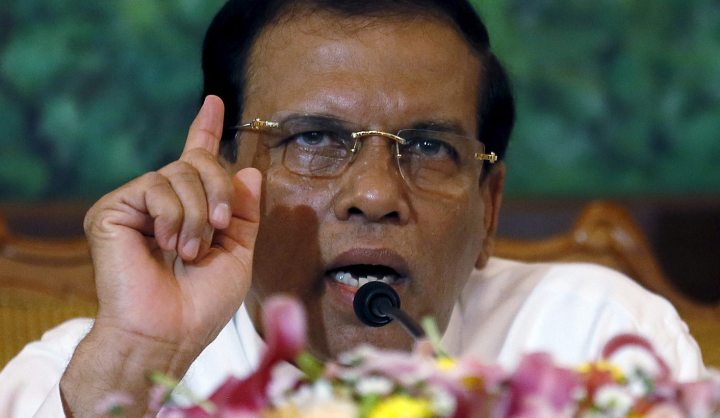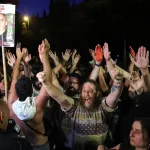World
Sri Lanka: A dream of becoming India’s Hong Kong

The large island south-east of the foot of India is capable of becoming to the subcontinent what Hong Kong is to mainland China. Sri Lanka’s government is easing trading conditions to encourage investment in the hope that following “a new path” could reap dividends. By GREG MILLS.
“Financial discipline is being brought in. We are freeing exchange controls. We have embraced the IMF, and allowed easier trading. The government is putting non-strategic investments in State-Owned Enterprises on the market, as part of our need to reduce our debts. We are also,” says Sri Lanka’s Finance Minister Ravi Karunanayake, “aiming to improve our revenue, with higher tax compliance, and a bigger base.”
“Our country,” he emphasises, “is taking a new path.”
Not for the first time.
Sri Lanka’s devastating civil war between the Singhalese-led majority and the minority Tamil Tigers, which cost perhaps 100,000 lives over three decades, displacing nearly a million more of Sri Lanka’s 21-million people, ended with the Tigers’ military defeat in 2009. This came after a multitude of false negotiated dawns in the peace process, after which war was given a chance.
A big bump followed that was, unsurprisingly, overwhelmingly positive. The economy grew at an average 6.4% between 2010-2015, in the process dragging the country from being based on agriculture, to services. By 2015 the country ranked 73rd on the UN’s Human Development Index, and achieved most of the world body’s Millennium Development Goals.

Photo: Streets of Colombo. (Greg Mills)
But the peace dividend also brought new challenges.
The new government that took over in 2015 inherited, in the words of one finance ministry official, “a balance sheet that did not balance”. Euphoric spending by the previous incumbents fuelled by fresh Chinese credit saw debt rise to 80% of GDP, or $64-billion in a $80-billion economy. Debt servicing now consumes three-quarters of the budget, and tax revenue remains low, at 13.8% to GDP, even though this is up from 10.2% in 2015.
The fiscal challenges are compounded by a mid-level skills challenge and that, as so many other developing countries realise, feeds into unemployment or, in Sri Lanka’s case, underemployment. Emblematically “we have 1.5-million tuk-tuks on the island”, says the official, “but they probably only work two hours a day”.

Photo: Sri Lankan three-wheeler or tuk-tuk drivers travel in their vehicles in a procession towards the President Secretariat in preparation for a strike in Colombo, Sri Lanka, 02 December 2016. EPA/M.A.PUSHPA KUMARA
The previous government, led by veteran strongman Mahinda Rajapaksa, which had won the war, was seen by members of the business community as “corrupt and arrogant”.
The government that succeeded him is seen by some as “lacking consistency” and “weaker” but, overall, “more business friendly”. In part this is an inevitable challenge, given that it is made up of a coalition of traditional political rivals.
It also however relates to the twofold challenge of executing against vision and, in the process, of the imperative to make choices.
Colombo is, of course, not alone in this regard. While the SA Government is reportedly set to advise the Sri Lankans on setting up a Truth and Reconciliation-type process, they might also usefully compare notes on the difficulties of implementation.
.jpg)
Photo: General view of the lush Loolkandura green tea plantations started by James Taylor of Scotland in 1867 and replanted several times, still providing the tender leaves and the bud for the world renowned Ceylon tea, in Nuwara Eliya, 180 km from Colombo, Sri Lanka, 02 January 2014. The first commercial seeds of tea were planted by James Taylor in 1867 at Loolkandura (or Loolecondera). Thus begun the tea sector in Sri Lanka, a mainstay of its economy and highly valued the world over for its savoring cuppa. Managed by individuals and later most plantations being taken over by the state during the 1970s, they have been re-vested with the private sector now. According to tea planters the value addition to tea has brought in approximately 500 million US dollars in 2013 and the government has ambitious plans to increase export production and the tea sector planning an increase towards 3 to 5 billion US dollars. EPA/M.A.PUSHPA KUMARA
Sri Lanka has an extraordinary locational advantage. “It can be,” says one businessman, “Hong Kong to India, for financial and other services.” It has immense advantages beyond geography. A strong tradition of banking, where virtually all of the teenage and adult population is banked, is complemented by the output of 100,000 university graduates annually, the island ranking first among the region in producing accountants. (Little wonder the birth rate is falling.)
For the reason of location there is massive potential, too, in its ports. With utilisation at just 68%, and run almost completely by the state, Colombo’s port handles just 7.65-million containers (20-foot equivalent units) annually, compared to Hong Kong’s 21-million, Singapore’s 32-million and the 36-million of Shanghai. There is plenty of upside.
Government actions can help, as they have done. There are now 12 free trade zones, with 400,000 jobs. The BPO sector has grown quickly, with now 45,000 jobs. The government’s Board of Investment, modelled on Singapore’s Economic Development Board, offers a “same day” one-stop shop for investors, with a range of tax incentives.
But this package is not enough, particularly when other governments are offering the same, or better.
Sri Lanka desperately craves foreign direct investment to offset its debt situation and grow the economy. Foreign direct investment has fallen from $1-billion in 2014 to $720-million in 2015 and $400-million last year, reflecting doubts about tax regime changes but, most important, given the suffocation of the private sector by a government with a finger in most pies.
To realise the country’s potential it is necessary, first – as the Finance Minister has acknowledged – to get government out of business and, at the same time, “end the government’s mentality that they can do everything”, says the island’s biggest soft-drink and ice-cream manufacturer.
Tough policy and political choices are necessary, which will inevitably impinge of the expectations of the government’s supporters and relax the temptation of money, power and control that go hand-in-hand with government’s investment in enterprises. This includes divesting government from businesses, from banks to ports and hotels.
While this alone will create efficiencies, more will be required than simply selling out.
Take tourism.

Photo: A tourist helps herself with local Sri Lankan fruits for dessert at the ‘Nuga Gama’ or ‘Banyan Tree Village’ at The Cinnamon Grand Hotel in Colombo, Sri Lanka 25 September 2016. Statistics from the Tourism Development Authority of Sri Lanka indicate an 11,8 per cent growth compared to last year in tourist arrivals during August 2016. EPA/M.A. PUSHPA KUMARA
The sector has grown from just 438,000 arrivals in 2008 to 1.8-million in 2015. Yet Malaysia, on which Colombo likes to model itself, did over 25-million arrivals in 2015, Indonesia 10.4-million, Thailand nearly 30-million and even Cambodia, traumatised by its own devastating conflict, 4.8-million.
The number of international standard hotel rooms in Colombo is just 4,300, compared to 15 times that number in Bangkok, eight times in Kuala Lumpur and more than twice as many in Ho Chi Minh City.
The government is intent on selling its ownership of the Hyatt and Hilton.
But like much else, getting tourism to work is in the detail. This depends on people doing stuff and not just talking about it.
In Colombo, I sat in on a meeting with the chairman of one of the country’s largest hotel chains and an adviser to the prime minister. Together they walked through the challenges faced in growing the sector from the first encounter with an immigration officer – “the country’s first ambassador“ – to baggage handling, the layout and type of duty-free shops, taxi counters and banks, to the presence of touts. “Tourism germinates growth throughout the economy, in restaurants, handicrafts, guides, leisure, watersports, and much else” they agreed.
They discussed the system of business class access through emigration – known as fast-tracking. There and then, a few calls later, and the problem was resolved. A small step, but significantly one in the right direction; in the process, answering more problems than just increasing tourist numbers.

Photo: Greg Mills and Sri Lankan Finance Minister Ravi Karunanayake, Colombo 2 March 2017
My tuk-tuk driver said his name was Muhammed Ali – “hands of stone”, he said. He may have mixed up his fighters, but his government will regardless need bits of steel to make the hard choices necessary to realise Sri Lanka as the Hong Kong of India. DM
Mills heads the Brenthurst Foundation, and is the co-author of the forthcoming Making Africa Work: A Handbook for Economic Success (Tafelberg). He has been in Sri Lanka.
Main photo: Sri Lanka’s President Maithripala Sirisena speaks to the media during a news conference after attending the United Nations General Assembly at the U.N. Headquarters, in Colombo, October 2, 2015. REUTERS/Dinuka Liyanawatte




















 Become an Insider
Become an Insider